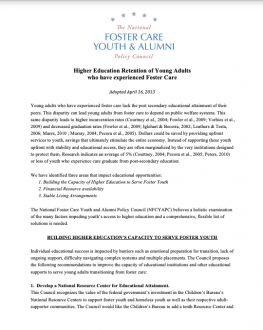
Young adults who have experienced foster care lack the post secondary educational attainment of their peers. This disparity can lead young adults from foster care to depend on public welfare systems. This same disparity leads to higher incarceration rates (Courtney et al., 2004; Fowler et al., 2009; Vorhies et al., 2009) and decreased graduation rates (Fowler et al., 2009; Iglehart & Becerra, 2002; Leathers & Testa, 2006; Mares, 2010 ; Murray, 2004; Pecora et al., 2005). Dollars could be saved by providing upfront services to youth, savings that ultimately stimulate the entire economy. Instead of supporting these youth upfront with stability and educational access, they are often marginalized by the very institutions designed to protect them. Research indicates an average of 5% (Courtney, 2004; Pecora et al., 2005; Peters, 2010) or less of youth who experience care graduate from post-secondary education.
We have identified three areas that impact educational opportunities:
- Building the Capacity of Higher Education to Serve Foster Youth
- Financial Resource availability
- Stable Living Arrangements
The National Foster Care Youth and Alumni Policy Council (NFCYAPC) believes a holistic examination of the many factors impeding youth’s access to higher education and a comprehensive, flexible list of solutions is needed.
Read the priority here.